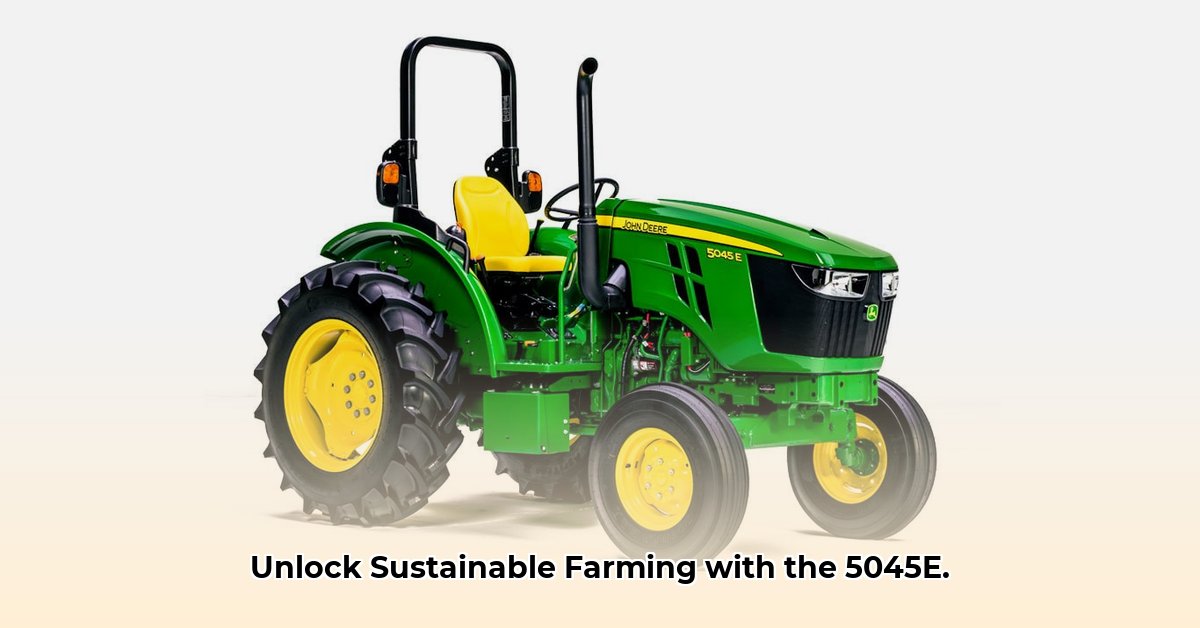
Choosing the right tractor is crucial for sustainable farming. This case study examines the John Deere 5045E, analyzing its suitability for eco-conscious agricultural practices. We'll explore its fuel efficiency, technological capabilities, versatility, cost-effectiveness, and maintenance requirements. For more information on John Deere parts, check out this helpful resource: John Deere Parts.
Fuel Efficiency: A Cornerstone of Sustainable Farming
Fuel costs significantly impact farming profitability and environmental footprint. The John Deere 5045E, with its 2.9L, 3-cylinder diesel engine, offers relatively good fuel economy compared to larger tractors. This translates to reduced greenhouse gas emissions, contributing to a smaller carbon footprint. However, newer models often exhibit superior fuel efficiency. A thorough comparison of fuel consumption data is necessary for a complete evaluation. Is the 5045E's fuel efficiency sufficient to offset its other operational characteristics, particularly considering the availability of newer, more fuel-efficient models?
Technology: Balancing Simplicity and Efficiency
The 5045E features straightforward technology. This simplicity simplifies maintenance and repair, potentially reducing downtime and associated costs. The absence of advanced features like GPS guidance and automated application systems means potential inefficiencies in resource use (fuel, fertilizer, etc.). Does the ease of maintenance and repair outweigh the potential for increased resource consumption due to a lack of advanced technology?
Versatility: Adaptability for Diverse Farming Operations
The 5045E's 45 horsepower and compact size make it suitable for smaller farms and diversified operations. Its maneuverability in confined spaces and adaptability to various tasks (plowing, hauling) are valuable for farms employing diverse cropping or livestock production strategies. Its versatility is a strong point for sustainable farming practices that emphasize crop diversification and resource optimization.
Cost Analysis: New vs. Used – A Sustainable Investment
The availability of used 5045E tractors offers a cost-effective entry point for sustainable farming, particularly for beginning farmers or those on tight budgets. Reduced initial investment frees up capital for other sustainable practices like soil testing or organic fertilizer acquisition. However, used equipment necessitates more diligent maintenance and repair, which need factoring into the total cost of ownership. Does the lower initial investment of a used 5045E outweigh the potential increase in long-term maintenance costs?
Maintenance and Repairs: Proactive Strategies for Longevity
Diligent maintenance is crucial for extending the lifespan of the 5045E and maximizing its fuel efficiency. Regular servicing, including timely oil changes, filter replacements, and tire pressure checks, helps prevent costly breakdowns and ensures optimal performance. Moreover, proactive maintenance contributes to long-term cost savings and aligns with the principles of sustainable resource management.
Actionable Steps: Integrating the 5045E into your Sustainable Farm
Successfully integrating the 5045E into a sustainable farming operation requires a structured approach:
Assess Farm Needs: Carefully evaluate your farm's size, soil types, crop diversity and specific tasks to determine if the 5045E's capabilities align with your requirements.
Develop a Comprehensive Budget: Include purchase price, maintenance, repairs, fuel costs, and potential upgrades. This will allow for a clear understanding of the total cost of ownership.
Consider Strategic Upgrades: Improve efficiency by making cost-effective upgrades, improving soil tillage or employing precision fertilizer application techniques.
Plan for Long-Term Evolution: View the 5045E as a stepping stone. As your farm's needs and budget evolve, plan for future equipment upgrades to incorporate more advanced technologies.
Weighing the Pros and Cons: A Balanced Perspective
| Feature | Pros | Cons |
|---|---|---|
| Fuel Efficiency | Relatively good fuel economy, lower operational costs for its class. | Lower efficiency than newer models, higher long-term fuel consumption. |
| Technology | Simple, reliable mechanics; easier and cheaper maintenance. | Lacks advanced features; potentially lower overall operational efficiency. |
| Versatility | Suitable for diverse tasks on smaller farms; high maneuverability. | Limited power output; might restrict certain more demanding applications. |
| Cost | Affordable used options available; lower initial investment. | Higher potential for maintenance and repair costs. |
The John Deere 5045E can be a valuable tool in sustainable farming, but careful consideration of the pros and cons is crucial. Further research into comparative fuel consumption and maintenance costs is recommended for a comprehensive assessment. Sustainable agricultural practices require thoughtful planning and resource management.